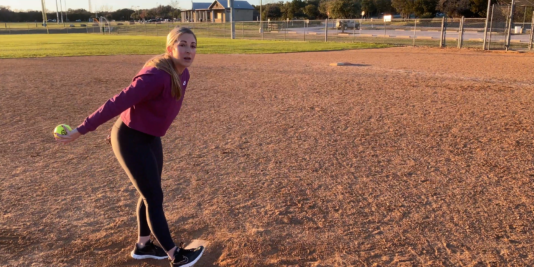I recently was introduced to the book Mind Gym: An Athlete’s Guide to Inner Excellence by Davis Casstevens, and I absolutely feel in love with it. It has great stories, very motivational and inspiring, right up my alley in so many different ways. In one of the chapters, Riding the Pines, Casstevens writes about an article he himself had read about being your own boss, thus leading him to come up with the idea for an athlete to “inc” himself/herself (ex. AmandaScarboroughInc) and the idea that your “company” (ie YOU) are a stock. Everything you do increases or decreases your value to the public. The “public,” in my eyes, can either be considered your current team OR the “public” can be a college recruiting you. OR, if you are a player already committed, the “public” is your current college you committed to, as they are wanting to see your stock continue to increase in value before you actually set foot on their campus.
Even if you are not the star player of your team, you are still a commodity to your team. However, being a commodity is not just handed to you, you have to make yourself a commodity by earning it. Every day you have to work on getting your “stock” to climb…this could apply to every day starters, players who are injured or players who are not in the everyday starting lineup. Ask yourself the question every day when you are playing or practicing, what are you doing to get YOUR stock to climb? Having a bad attitude would decrease your value, not giving your best every single second at practice also would decrease the value of YOUR stock. Those of you who are not in the starting rotation have to remember, you are ONE PLAY away from being a starter. At any second the person in front of you could get injured, and then it could be your time to shine. It would be YOUR opportunity and YOUR chance to make the very most of it. Don’t you want to be the one prepared for that opportunity?
Your coaches are a reference…
If a company (ie college coach) is going to ask about acquiring your company (ie you as a player), what are your coaches going to say about you? Are they going to say you have a good attitude, works hard, coachable, and a real team player? Or are they going to say the complete opposite? Your coaches’ opinions do actually hold weight and college coaches take that into their opinion when thinking of whether to buy your stock (recruit) you or not.
Tweet Smart…
Along the same lines of this is social media with Facebook and Twitter. Before you put something up for the world to see, ask yourself, if my coach saw this, would this increase or decrease my value as a stock? Before putting your entire life and every personal move on twitter, be careful and think twice when it comes to language, relationships, friendships or any kind of social scene. Ask yourself, “is this tweet or status going to increase or decrease my value?” Twitter and Facebook should not be used to show that you are an emotional rollercoaster. A college coach is looking for someone who is positive, steady, and a leader. And remember, at any second, a college coach can get online, and go and check out these social media outlets.
Lead…
On the field, every inning think about if your stock is decreasing or increasing in value. This is not necessarily simply performance based, but think of other things that help raise your “stock” like being a leader and helping out your younger or new teammates . Are you going to be the teammate who watches as someone sturuggles to learn the system or to learn a drill? Or are you going to be the teammate who goes over and helps them work through things, thus increasing YOUR value and your TEAMMATE’S value? If you are the “boss” of a company, you aren’t just worried about yourself, you’re worried about the employees who work for you, too.
Observe….
If you are injured, because let’s face it, injuries are GOING to happen, but consider it a perfect time for you as player to start thinking about situations, pitch calling, trying to pick up grips of opposing pitchers, trying to pick up the opposing team’s signals, making sure your teammates are in the right spot on defense, helping to keep your team’s energy up. There are SO MANY things you can be doing during the games and at practice. If you are a player who is injured, and you are not doing anything to help your team on a consistent basis, your stock value is dropping. You can do nothing or use the time you are injured wisely, the choice is yours. Observe. Visualize. Go through situations mentally, so once you get into the game and get back out there, it’s like you’re picking up right from where you left off. You possibly could be a bit behind physically wise from not being able to practice, but mentally pick up right from where you left off because you still visualized yourself being out there in any situation, and your mind is still as strong as it was when you were healthy.
Contribute…
In Mind Gym, Casstevens talks about “can-do” planning. This is when a player makes a list of things you can do when you’re “riding the pines,” whether you are injured or just not in the start lineup. The list is made up of things you can still be doing to help contribute to your team, and I listed a few things above such as studying your opponent by trying to pick signals (defensive and offensive), trying to pick pitches by seeing if the pitcher tips any pitches, cheering your teammates on, or exercising in the weight room. Write these things down and see all the different ways you can still contribute to your team and to yourself.
One thing in the game of softball we NEVER can control is the lineup, and who is in the starting 9. One thing we ALWAYS can control is our attitude and how we accept that lineup. Everyone wants to be playing, without a doubt. Have the attitude though, that you are continuing to learn and at any moment you could be called upon to action. You can control that aspect of the game, always. Be so ready in the dugout, that if someone gets hurt who plays in front of you or you get a chance to pinch run or pinch hit, that you are ready for that opportunity. Make it be as if that opportunity doesn’t come as a surprise to you during the game, because mentally you are ready, and it’s as if you were already in the starting 9. When you get that opportunity to go into the game, you’ve got to be able to make the most of it, and take it and run with it. THOSE are things you can control. Remember you can never never, (as a parent or a player) control the lineup of a coach. Casstevens quotes the serenity prayer in Mind Gym,
“God grant me the serenity to accept the things I cannot change, the courage to change the things I can, and the wisdom to know the difference.”

A simple quote that many players and player’s parents can really learn from and keep in their back pocket to remember. This is a helpful motto not just in our game of softball, but in life in general.
Teach your kids life lessons….
From a perspective of being a coach, I see parents all too many times who are not necessarily helping with this idea of their players being all they can be and “increasing their value” even if they are not in the every day lineup. They actually KEEP the player from increasing their value because of what is being said in the car ride home from games or in between games, or wherever the conversation may be taking place.
Let me say, that I totally understand that some players and families are not going to be happy, and there will be players who switch teams. It happens. It’s a part of our game, and I do think it is important to be in an environment and in a situation where everyone can be happy, as it’s a two way street with the team and also the player. A player will THRIVE in a positive situation, as it’s important to find a place where your daughter can feel the most beautiful (ie. happy) when she is playing. However it’s how you handle it before the move that decreases or increases the “value” of your daughter as a player and the lessons you are teaching her with such an important change. Even if you are not happy with your situation, it should NOT be shown in the stands or on the field. There is a time and a place for everything, and if you want your daughter’s “stock” to be at the highest value for the “trade,” then it is important to handle it in an appropriate manner. Even if you KNOW you are switching teams at the end of the year, or whenever it may be, still enable your player to get better every single game and practice no matter the situation. There is always learning to be done in any situation. Switch teams when the time may come for that change, but up until that last second, encourage your daughter to continue to increase her stock.
Teach young players that it’s NOT just about the players who are in the starting 9, that there are lessons to be learned that are outside of softball and bigger than the game of softball. Kids are so observant and are always learning and picking up things. Even if you are not happy with your team and situation, it is not an out to not work hard and not continue to invest in yourself. Teach your young players that even when there is a tough situation, you work through it until the time comes for the actual change Don’t teach them that when a tough situation comes up, it’s okay for them to “check out” of practice and games by having a poor attitude towards their teammates and coaches and not working hard. Commit to being your very best, at all times, even when no one is watching. Player’s stock value is dropping or increasing due to the lessons that parents and coaches are teaching them by their actions, especially by what parents are saying to them outside of the actual field.
The journey…
What lessons are you allowing your players to learn along the journey? A lot of times we get caught up on the outcomes (wins and losses), but really when we look back, it’s not all about championship rings and innings played and batting averages. I don’t remember those things as much as the lessons I learned from my parents and coaches, the way that those people made me FEEL and the great mentors I met along the way who have made me the person I am today. We get caught up in the moment and forget about the longrun. It’s not a sprint, it’s a marathon. We all learn from mistakes and from failing, much more than we learn from when we don’t fail. Allow your players to fail, this allows them to learn. The failing is part of the journey. “Failing” could be striking out. “Failing” could be making an error. “Failing” could be not being in the starting lineup. Once you define a fail, more importantly, define how you are going to learn from it.
EVERYTHING is a process in life, and your goal is that that your “stock” is TRENDING upward. This means you’re going to have moments of downs, we all do. But when you look back, you hope to see that if your playing career or life was a graph, you would see the trend increasing over an amount of time.

My “company” was surrounded by mentors who helped increase my “stock” every day, and I was not faced with the social networking animals of Twitter or Facebook (until I got to college). Whether you’re injured, not an every day starter, or you’re in the starting 9, engage in can-do planning and recognize the things you CAN change vs the things you CANNOT change and see the difference. Every day, commit to increasing your value, as a player and as a person, whether it’s on or off the field. Remember that there are bigger goals ahead for you, and the actions that you have now are going to effect what happens to you later.




















